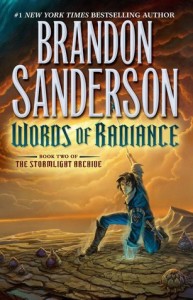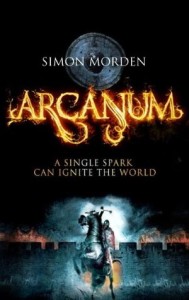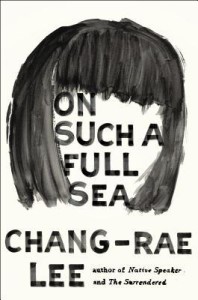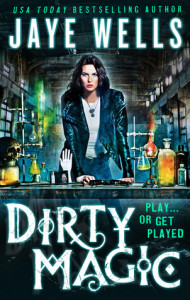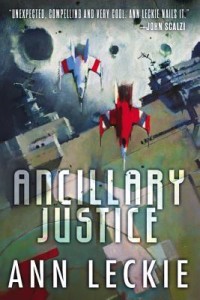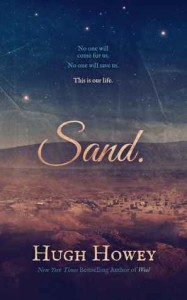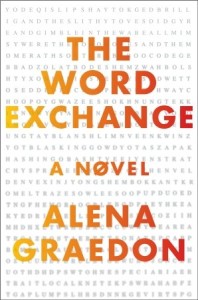
Disclaimer: I received this eARC in exchange for an honest review. Also, as this was an ARC, any content is subject to change by time of publication.
The Word Exchange, debut novel by Alena Graedon, is a new and quite unique book. The novel is being published by Doubleday and will be release on April 8th. The story is set in the near future when printed publications are a distant memory, held on to by only the most dedicated enthusiasts. Electronic devices reign and in the US, the Meme is king. While most of us are already constantly connected through our mobile devices and high speed data plans, Memes take it to the next level. Not only are they connected to everything and constantly using sensors to asses the user’s environment, they are also intuitive. Not in the way my Android has an “intuitive interface”, no, they actually can sense what you want. They can order for your, hail a cab, or even look something up for you without asking it. This includes looking up words in the interactive pay-per-word dictionary (well, sort of) the Word Exchange. There are even even accessories that stream data to the user, some of which can further link to your mind. Some even go as far as an implanted chip.
Anana Johnson (our main character) works with her father, Doug, at the North American Dictionary of the English Language (NADEL) in New York City. Doug is working on finishing the third edition of the NADEL for the upcoming publishing date. As a linguist, editor and general print and book supporter, Doug is not fond of Memes. More than that, he does not trust them. It is more than just seeing the electronic devices as competition, as they are also developing an electronic version of the NADEL. Doug’s behavior and attitude begins to grow more paranoid about the devices and warns Anana about them. he also preemptively give her a course of medicine in case of an upcoming sickness.
Soon after this Doug’s erratic behavior increases, he mysteriously disappears. With her father missing, Anana tries to track him down with the help of her co-worker and her father’s protege, Bart. In looking for any sign of Doug or where he may have gone, Anana stumbles into dangerous situations, subversive conspiracies and the Diachronic Society, a secret(ish) society which shares many of her father ideals and is clearly anti-Meme and against it’s parent company, Synchronic. On top of all of that, a word-flu manifests, with a combination of flu like symptoms as well as symptoms affecting the infected person’s speech (aphasia). The story is a mixture of Sci-Fi, mystery, thriller and somewhat dystopian.
The characters, especially Anana and Bart are very well developed and you get a nice sense of who they are. The writing is also very well done and the tone is unique. It is written from two perspectives, one being Anana, the other being Bart’s journal. I tend to appreciate stories with multiple perspectives as it adds depth to both the reader’s ability to interpret the events as well as an insight into how each character perceives the same things in different ways. My criticism of the writing style is somewhat difficult. I loved the way it was done, but the language seemed a little much. The author appears to have tried to find more obscure words in a thesaurus and really upped the reading level. I get it, I really do. After finishing the book I truly appreciated the value of doing this. The irony of having to look up works while reading on my Kindle was not lost on me and even caused a few errant chuckles. The language lent both to the story and the style. There was motivation there for the author, but I do see this as something that will really divide readers. Certain people will be scared off or turned off with the overly large or unknown words. In the end it works, quite well actually. I do see this as being a barrier for some people who might otherwise like this story.
The plot itself was very good as well. I have always been more into the Sci-Fi and fantasy aspects of stories and less into the mysteries, but as a plot device the mysteries surrounding both Doug and the word-flu worked well. The progression and pace of the story flowed very well in my opinion. I think that many of the allusions and points centering around technology and the loss of printed material is very valid today (have you seen how few bookstores there are in NYC now?). As is the idea that people do not feel the need to learn things when they can access everything instantly instead. Much of this foreboding content made this whole idea seem very real. I have relatives in school who do not even have text books. Entire schools districts are using nothing but a tablet.
There are some things that even with the suspension of disbelief are a little hard to accept. The way the word-flu spreads is well though out an explained… to a point. After that point of plausibility, it gave me pause. I try not to nitpick, but it bothered me a little that such a well thought out story could have that flaw. The one other thing that got to me where some of the dates. This is obviously set a few years in the future, but the year is not explicitly mentioned. Regardless, there are years mentioned concerning events in various characters’ pasts. I am not sure the years work. The time may work out, but it made me stop and think every time. Also, I am curious what this does to the value of the book in say five years. Would it then be marketed as alternative history? It might be comparable to if Orwell wrote Nineteen Eighty-Four in the late 1970’s.
In the end the overall story was very enjoyable, entertaining and absorbing. These traits more than anything are really what is important when looking for a good book. A lot of things that I was wondering about came together in the end which made many things richer upon thinking back. I really like the characters and related to both them and the main thematic ideas. While there were some flaws, everything has flaws, the question is how noticeable of distracting they are. I would give this book a 4/5. There were only a few issues I had with the book, but I really liked it very much. I was not something I sacrificed sleep over, not able put down, but it was something I really liked from beginning to end. I recommend this book without hesitation. I really wanted to go out and but some printed books after this, but something about reading on the kindle and being able to look up words just felt too right.
Be on the lookout for it on shelves and beamed to your devices ob April 8th. To read more about this novel check out the following links to: the publisher’s page (Doubleday), the distributor (Random House), Alena Graedon’s Facebook and Goodreads.

